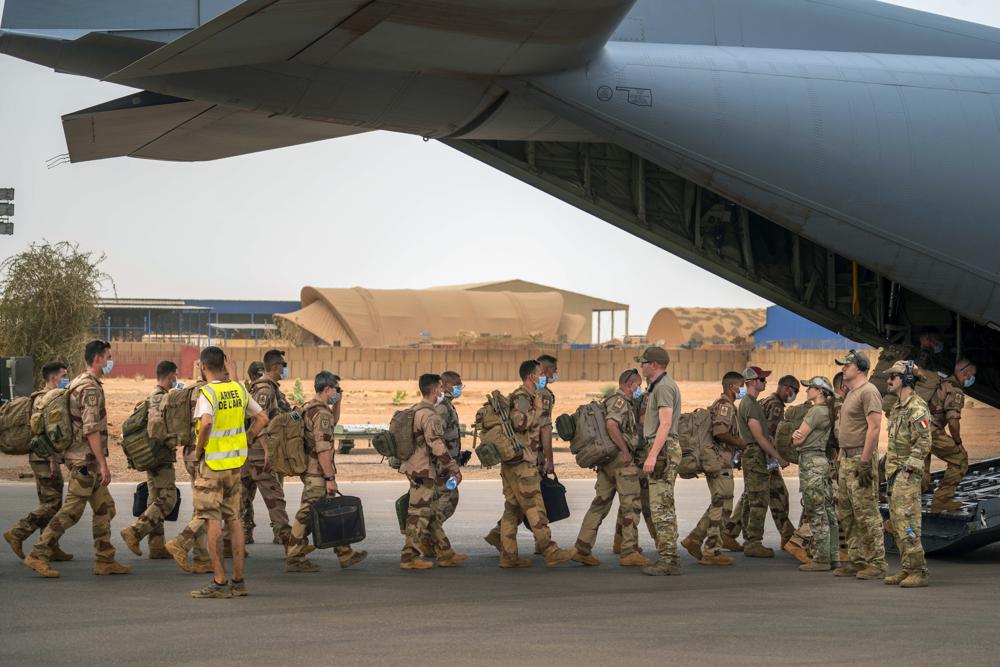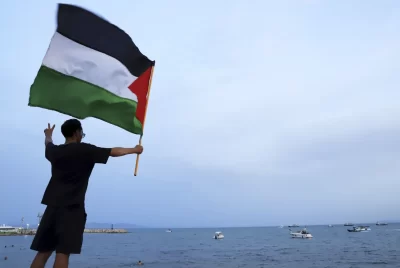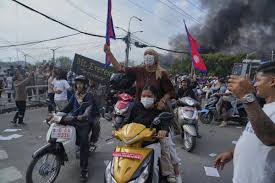
PARIS— President Emmanuel Macron announced that France will withdraw its troops from Mali nine years after it first intervened to drive Islamic extremists from power but intends to maintain a military presence in neighboring West African nations.
During a news conference Thursday in Paris, Macron accused Mali’s ruling military junta of neglecting the fight against Islamic extremists and said it was logical for France to withdraw since its role is not to replace a sovereign state on the battlefield.
“Victory against terror is not possible if it’s not supported by the state itself,” the French leader said.
France has about 4,300 troops in the Sahel region, including 2,400 in Mali. The so-called Barkhane force is also involved in Chad, Niger, Burkina Faso and Mauritania.
A French Armed Forces spokesperson, Col. Pascal Ianni, said France ultimately aims to reduce the number of its troops in the Sahel to 2,500-3,000.
An August 2020 coup led by Col. Assimi Goita grabbed power in Mali. Goita carried out a second coup by dismissing the civilian leaders in Mali’s transitional government and putting himself in charge last year.
“We cannot remain militarily involved” alongside Malian transitional authorities with whom “we don’t share the strategy and goals,” Macron said.
European leaders simultaneously announced Thursday that troops from a European Union-led military task force known as Takuba also would withdraw from Mali. The Takuba task force is composed of several hundred special forces troops from about a dozen countries, including France.
Last month, Mali’s transitional government asked Denmark to pull out its small military force last month just one week after it arrived as part of the EU force.
Tensions have grown between Mali, its African neighbors and the European Union, especially after the West African country’s transitional government allowed Russian mercenaries to deploy in its territory.
Macron said a coalition of allies will remain present in the Sahel and the Guinea Gulf to counter actions from Al-Qaeda and the Islamic State.
He organized a summit in Paris on Wednesday evening to address the issue with regional and European leaders of countries involved in the Sahel.
Representatives from Mali and Burkina Faso coup leaders were not invited since both nations were suspended from the African Union following coups.
Senegalese President Macky Sall, who also chairs the African Union, said security and the fight against terror was “vital” for both Europe and Africa.
Sall said there was a consensus during among EU and African leaders during their discussions that the fight against terror “should not be the sole business of African countries.”
Ghana’s President Nana Akufo-Addo, who heads the Economic Community of West African States, said “it cannot be that terrorists elements will find permanent home in West Africa.”
Macron said the “heart” of the French operation “won’t be in Mali anymore” but in neighboring Niger, especially in the region bordering Burkina Faso, Macron detailed.
Anti-poverty organization Oxfam said the planned withdrawals of the Barkhane operation and the Takuba task force from Mali was a “terrible admission of failure.” The group said more than 2.1 million of people have left the country because of violence, and another 13 million were in need of humanitarian assistance.
“The military redeployment announced today will solve nothing if lessons are not learned about the reasons for this failure,” Assalama Dawalack Sidi, Oxfam’s West Africa regional director, said. “As long as the storm of inequality will blow, it will fuel the frustrations and sense of injustice of populations that have been marginalized for too long and the Sahel will burn.”
French Armed Forces spokesperson Ianni disputed Oxfam’s assessment, saying the withdrawal from Mali “does not represent a tactical defeat or a military defeat.” He said the decision will allow French troops to keep supporting neighboring countries in their fights against extremists.
With the relocation to Niger and the reorganization of the military set up in the region, France and its allies hope to avoid a situation similar to the chaotic aftermath of the U.S. troop withdrawal from Afghanistan last year.
The issue is important for Macron, who is expected to run for a second term in France’s April 10 presidential election.
French forces have been active since 2013 in Mali, where they intervened to drive Islamic extremists from power. But the insurgents regrouped in the desert and began attacking the Malian army and its allies.
Macron said support for civilians in Mali would continue, but he blamed the junta now ruling the country for its decision to hire a private Russian military contractor known as the Wagner Group, which the EU accuses of fomenting violence and committing human rights abuses in Africa.
“They have now come to Mali to act in a very predatory manner,” Macron said. He asserted there are some 800 Wagner mercenaries present in the country who “have mostly come to secure their economic interests.”
Germany’s deputy foreign minister, Katja Keul, said the German government was “in complete agreement with France and our partners” that it was time to end Europe’s military involvement in Mali.




